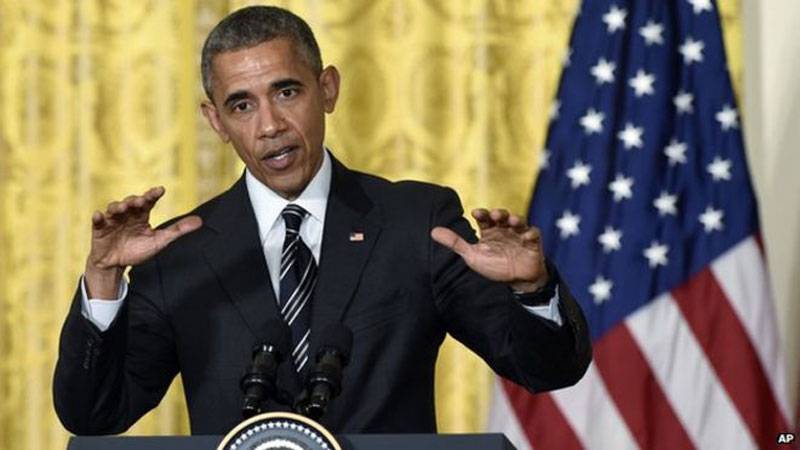WASHINGTON - US President Barack Obama has said that “it’s hard to envision” the creation of a Palestinian state after Israeli Prime Minister Benjamin Netanyahu’s recent remarks rejecting the idea, and that the possibilities of a lasting peace right now are “very dim.”
“There still does not appear to be a prospect of a meaningful framework established that would lead to a Palestinian state,” Obama said in response to a question at a press conference with Afghan President Ashraf Ghani.
Obama recalled that, on the eve of the Israeli elections last March 17, Netanyahu said about the creation of an independent Palestinian state that “on my watch this is not going to happen.”
“I took him at his word that that’s what he meant and I think that a lot of voters inside of Israel understood him to be saying that unequivocally,” the US president said.
Two days later, Netanyahu backtracked and said he did indeed want a two-state solution, but that “under the present circumstances, today, it is unachievable.”
Despite Netanyahu’s explanations, Obama said, “there still does not appear to be a prospect of a meaningful framework being established that would lead to a Palestinian state. It’s not just my estimation, I think it’s hard to envision how that happens based on the prime minister’s statements.”
Obama said no one has envisioned the creation of a Palestinian state “overnight.” But he said the goal is to give Palestinians hope for a secure state adjoining Israel.
The president recalled that, up to now, “the premise has been both under Republican and Democratic administrations that as difficult as it was, as challenging as it was, the possibility of two states living side by side in peace and security could marginalize more extreme elements, bring together folks at the centre and with some common sense we could resolve what has been a vexing issue.”
But because that possibility seems very unlikely right now, it “may trigger reactions by the Palestinians that in turn elicit counter reactions by the Israelis and that could end up leading to a downward spiral of relations that would be dangerous for everybody, and bad for everybody,” Obama warned. With regard to his dealings with Netanyahu, he said he has a “very businesslike” relationship with the Israeli leader, a term he has also used to describe his relations with Putin.
“I’ve met with him (Netanyahu) more than any other world leader. I talk to him all the time,” Obama said, “so this can’t be reduced to somehow a matter of let’s all hold hands and sing ‘Kumbaya (a spiritual song).’”
AFP adds: Palestinian prime minister Rami Hamdallah urged rival factions to set aside their differences, even as protesters gave him a cool reception in war-battered Gaza on Wednesday.
It was only Hamdallah’s second visit to the Gaza Strip since a unity government agreed on by rivals Fatah and Hamas took office last June. “We have come here today to strengthen national reconciliation and to restart dialogue with all Palestinian factions,” Hamdallah told a news conference in Gaza City, where he was to meet officials of the Islamist movement Hamas.
He vowed that civilian workers of Hamas’s de facto administration in Gaza would go on the payroll of the West Bank-based Palestinian Authority (PA), which is dominated by the Fatah party.
Several dozen protesters at the news conference chanting “Leave, Leave, Hamdallah!” held up banners that read: “No welcome for those who besieged Gaza”, an accusation that the PA was complicit in Israel’s blockade of the territory.
Hamdallah last visited the coastal strip in October for a show of Palestinian unity aimed at reassuring international donors at a conference in Cairo that month.
An April 2014 reconciliation deal leading to the unity government sought to bridge the gulf between the factions since Hamas evicted Fatah from Gaza in a week of deadly clashes in 2007.
But a devastating 50-day war last summer between Hamas and Israel as well as a dispute over payment of the salaries of tens of thousands of Hamas security forces have blocked progress on the deal.
Thursday, April 18, 2024
Prospects for Israeli-Palestinian peace dim, says Obama
Netanyahu’s statements

President summons Senate session on April 22
9:07 PM | April 18, 2024
Turkish top general calls on CJCSC Sahir Shamshad Mirza
9:06 PM | April 18, 2024
Filling superior courts' vacancies top priority: CJP
9:05 PM | April 18, 2024
PM says will personally monitor Saudi investment in Pakistan
9:04 PM | April 18, 2024
PTI nominates Shibli Faraz to be opposition leader in Senate
9:03 PM | April 18, 2024
Hepatitis Challenge
April 18, 2024
IMF Predictions
April 18, 2024
Wheat War
April 18, 2024
Rail Revival
April 17, 2024
Addressing Climate Change
April 17, 2024
Justice denied
April 18, 2024
AI dilemmas unveiled
April 18, 2024
Tax tangle
April 18, 2024
Workforce inequality
April 17, 2024
New partnerships
April 17, 2024
ePaper - Nawaiwaqt
Advertisement
Nawaiwaqt Group | Copyright © 2024





